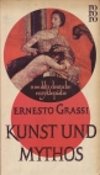Ernesto Grassi (1902–1991)
Author of Rhetoric as Philosophy: The Humanist Tradition
About the Author
Ernesto Grassi was a professor of philosophy at the University of Munich and director of the Institute of Humanistic and Philosophic Studies.
Series
Works by Ernesto Grassi
Schiller : Wallensteins Lager + Die Piccolomini + Wallensteins Tod + Dokumente (1961) — Editor — 6 copies
Goethe : Römische Elegien + Venetianische Epigramme + Tagebuch der italienischen Reise (1984) — Editor — 4 copies
Renaissance Humanism: Studies in Philosophy and Poetics (Medieval & Renaissance Texts & Studies S.) (1988) 3 copies
Folly and Insanity in Renaissance Literature (Medieval and Renaissance Texts and Studies) (1986) 2 copies
Giacomo Casanova : Memoiren 2 : Lotterie und Kabbala : Esther : Köln ; Bonn ; Stuttgart : Bekehrung und Verführung :… — Editor — 2 copies
Giacomo Casanova : Memoiren 1 : Bettina : Rom, Paris, Wien : Die Flucht aus den Bleikammern (1925) — Editor — 2 copies
Associated Works
Platon. Sämtliche Werke Bd. 1: Apologie des Sokrates, Kriton, Ion, Hippias II, Theages, Alkibiades I, Laches,… (1998) — Editor, some editions — 62 copies
Menon, Hippias I, Euthydemos, Menexenos, Kratylos, Lysis, Symposion (1993) — Editor, some editions — 19 copies
Parmenides ; Phaedrus ; Sophist ; Theaetetus [Translation] (1998) — Editor, some editions — 16 copies
Tagged
Common Knowledge
- Birthdate
- 1902-05-02
- Date of death
- 1991-12-22
- Gender
- male
- Nationality
- Italy
- Birthplace
- Milan, Italy
- Place of death
- Munich, Bavaria, Germany
- Occupations
- philosopher
Members
Reviews
You May Also Like
Associated Authors
Statistics
- Works
- 26
- Also by
- 7
- Members
- 132
- Popularity
- #153,555
- Rating
- 3.7
- Reviews
- 2
- ISBNs
- 29
- Languages
- 4
- Favorited
- 1


